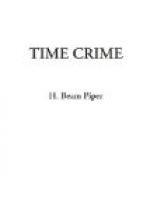“Phrakor Vuln,” the man who was working on the charts introduced himself. “Synthesist.” He introduced the others.
Vall made a point of the fact that Dalla was his wife, in case any of the cops began to get ideas, and mentioned that she spoke Kharanda, had spent some time on the Fourth Level Kholghoor, and was a qualified psychist.
“What have you got, so far?” he asked.
“Two different time lines, and two different gangs of Wizard Traders,” Phrakor Vuln said. “We’ve established the latter from physical descriptions and because both batches were sold by the Croutha at equivalent periods of elapsed time.”
Vall picked up one of the kidnap-story cards and glanced at it.
“I notice there’s a fair verbal description of these firearms, and mention of electric whips,” he said. “I’m curious about where they came from.”
“Well, this is how we reconstructed them, Chief’s Assistant,” one of the girls said, handing him a couple of sheets of white drawing paper.
The sketches had been done with soft pencil; they bore repeated erasures and corrections. That of the whip showed a cylindrical handle, indicated as twelve inches in length and one in diameter, fitted with a thumb-switch.
“That’s definitely Second Level Khiftan,” Vall said, handing it back. “Made of braided copper or silver wire and powered with a little nuclear-conversion battery in the grip. They heat up to about two hundred centigrade; produce really painful burns.”
“Why, that’s beastly!” Dalla exclaimed.
“Anything on the Khiftan Sector is.” Skordran Kirv looked at the four slaves at the tables. “We don’t have a really bad case here, now. A few of these people were lash-burned horribly, though.”
Vall was looking at the other sketches. One was a musket, with a wide butt and a band-fastened stock; the lock-mechanism, vaguely flintlock, had been dotted in tentatively. The other was a long pistol, similarly definite in outline and vague in mechanical detail; it was merely a knob-butted miniature of the musket.
“I’ve seen firearms like these; have a lot of them in my collection,” he said, handing back the sketches. “Low-order mechanical or high-order pre-mechanical cultures. Fact is, things like those could have been made on the Kholghoor Sector, if the Kharandas had learned to combine sulfur, carbon and nitrates to make powder.”
The interrogator at one of the tables had evidently heard all his subject could tell him. He rose, motioning the slave to stand.
“Now, go with that man,” he said in Kharanda, motioning to one of the detectives in native guard uniform. “You will trust him; he is your friend and will not harm you. When you have left this room, you will forget everything that has happened here, except that you were kindly treated and that you were given wine to drink and your hurts were anointed. You will tell the others that we are their friends and that they have nothing to fear from us. And you will not try to remove the mark from the back of your left hand.”




